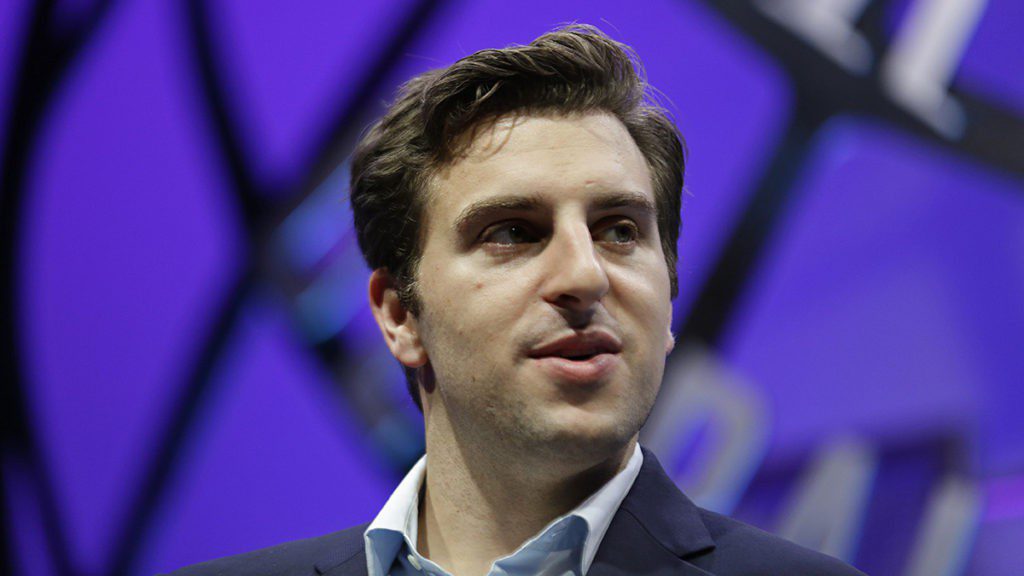 FILE - In this Nov. 4, 2015 file photo, Airbnb co-founder and CEO Brian Chesky listens to a question at the Fortune Global Forum in San Francisco. In March 2020, Chesky was working on the financial filings for the company’s hotly anticipated initial public offering. But the coronavirus upended global travel _ and all his plans. Still, Chesky is optimistic. (AP Photo/Eric Risberg, File)
FILE - In this Nov. 4, 2015 file photo, Airbnb co-founder and CEO Brian Chesky listens to a question at the Fortune Global Forum in San Francisco. In March 2020, Chesky was working on the financial filings for the company’s hotly anticipated initial public offering. But the coronavirus upended global travel _ and all his plans. Still, Chesky is optimistic. (AP Photo/Eric Risberg, File) By DEE-ANN DURBIN AP Business Writer
Three months ago, Airbnb co-founder and CEO Brian Chesky was working on the financial filings for the company’s hotly anticipated initial public offering. He had just returned from Palm Springs, California, and was planning a spring vacation with college pals.
But the coronavirus upended global travel — and all his plans.
“My world’s gotten really small,” Chesky told The Associated Press from his home in San Francisco, where he’s spent the last 10 weeks.
Airbnb expects its revenue will be cut in half this year. Chesky recently laid off 25% of Airbnb’s staff — or 1,900 workers — and suspended projects not directly related home-sharing, like movie production and transportation. It’s funding operations, in part, with a $2 billion investment from two private equity firms.
Still, Chesky is optimistic. He says Airbnb has more listings now — over 7 million — than it did at the beginning of the year as hosts open their homes to make some extra cash. The company has hired experts to develop new cleaning protocols, so guests will feel comfortable booking again.
Above all, he says, people will yearn to travel after this lonely pandemic.
“I think travel is going to feel special again,” Chesky said. “We won’t take it as for granted as we did before.”
The Associated Press spoke with Chesky about Airbnb and the future of travel. Answers have been edited for length.
Q: What will travel look like when it returns?
A: I do think it’s going to take time. I think people are not going to get on an airplane for a while. Travel is going to resume by car, and the really big trend is going to be people traveling near them. For example, 13% of our business pre-COVID was people traveling and staying at Airbnbs 50 miles from them. Now that’s 30%. A third of our business is basically people traveling to the next town over. So travel will become more last minute, more affordable, more nearby. And more leisure than business. One other thing is, we’re going to be in less urban areas. People aren’t going to be interested — as much — in staying in super mega metropolises.
Q: What do Airbnb’s bookings look like right now? Is there any point in the future where things start to look like they did before?
A: Yes. So trips less than a week away and more than six months from now are really popular. There’s a lot of growth around near-term and very long term. It’s the medium term that is way down. People kind of feel like, “We know what the world will be like in a week, so I’m comfortable traveling, and I kind of feel like six months from now or a year from now, I’m pretty confident I’ll be able to travel. So I’m going to book this thing. But June, July? I’m going to wait on that one.”
Q: Airbnb has paused projects not directly related to sharing homes and experiences. Is that a permanent change?
A: I really want Airbnb to use this crisis to sharpen our focus, to get back to basics, back to the core of everyday hosts that offer homes and experiences. And I think the people who really yearn for that are going to want to stay in places that are really authentic and personal. We’re going to put in as many or more resources than before. It’s just going to come at the expense of not doing as many things. Transportation, for example, is on pause. I certainly don’t expect in the next year or year and a half to be working on it. One day? Very, very possible. It’s super hard to imagine what the world will look like in a year, let alone five years.
Q: You set aside $250 million to compensate hosts for some of the business they have lost. Will you have to do more?
A: The $250 million on the one hand, for us, it’s a lot of money. But for hosts, they are experiencing, in aggregate, much more of a shortfall than that right now. The No. 1 thing we can do is do everything we can to help them get more bookings and adapt their business to new types of demand, because that would be in the order of billions and billions of dollars.
Q: Is the IPO still happening this year?
A: We’re ready to go public when the markets are ready for us. We will be ready. No news to announce.
Inside Telecom provides you with an extensive list of content covering all aspects of the Tech industry. Keep an eye on our News section to stay informed and updated with our daily articles.